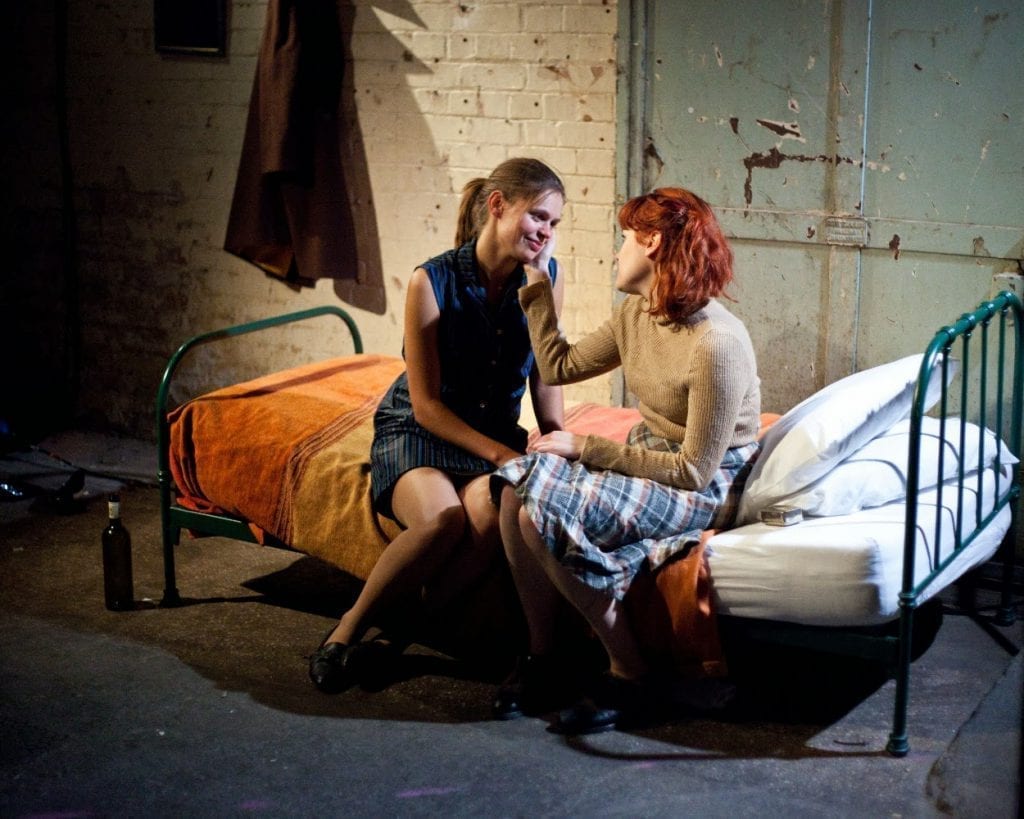“You create a place where people feel human”. Brian, an aging rock and roll star who has run away to East Berlin, proclaims the beauty and the potential of great music in a world that’s cold and empty.
Director Jamie Harper, in his new promenade style production, Heaven in Berlin, seems to strive to create such a world in a cold and empty room too. And if I didn’t feel ‘human’ in it, I did feel enthralled, enraptured, and mesmerized.
Heaven in Berlin asks the audience to enter into an old warehouse for a production that begins immediately upon entrance. A smoky haze fills the room and the moving lights create a world that feels like a dream or a memory from the past.
Lines slightly blurred, moments and images dramatized, but only in short bursts of scenes. Brian (Ian Bailey) has run away from his dying wife to teach contemporary music in East Berlin. An older man, who manages to retain his edge of ‘cool’, he finds himself involved with a university administrator, Greta (Annabel Capper), who feels trapped in the stagnate land of East Berlin and her commitment to her 17 year daughter, Judi (Heather Nimmo), a violin virtuoso. Tensions rise when Brian’s abandoned son, Mark (Boris Mitkov), comes over to try and convince his father to come home. Intermixed through all of this, is the mysterious artist turned cleaning lady, Ida (Ida Bonnast), who is put under pressure from an unknown Official (James Meunier).
The style of the production is absolutely beautiful and it is easy to become caught up in the world as you walk through this minimalistic, concrete room. The lights and movement guide you so despite action taking place simultaneously throughout the space, it does not feel like you miss anything. The use of the room and its staging only emphasizes the dreamlike quality of the production: twice, Brian stands on one end of the room gazing across the expanse, first towards a woman delivering a letter from his son, the second at Greta walking away.
Amid the fog, the long runway of plastic flooring, the music and the fantastic subtly of Ian Bailey the room actually looks like it is stretching out, the distance growing between the characters. However, the production is not just a serious peek behind the Iron Curtain – it is remarkably funny, the entire audience feels connected with each other and the very close actors through both drama and humor.
On occasion, the acting is too staccato and melodramatic. There are lines when characters stop themselves from saying something which come across as too purposeful, too rehearsed. However, the over the top nature of some of the dialogue and its delivery works for this type of stylized production of the past. It is rarely distracting. Similar is the use of music. The music, from the very beginning, with the visible band and a hypnotizing tone enhances the production – making transitions smooth and truly mimicking the emotion of the action occurring. Because of the promenade style, every now and again I found myself standing too close to a speaker at the start of a loud chord, but that is easy enough to adjust around.
I could not recommend a show more highly. I admit, I was nervous at first, when I, a newcomer to London, arrived alone, at night, to an abandoned warehouse. However, a sense of magic is present even from entering outside the establishment. Just don’t do what I did and come straight from class with a giant bag filled with a laptop and books – no need to carry that around for two hours!

